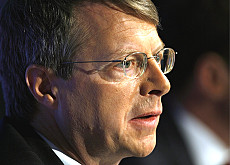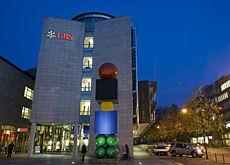UBS changes top manager

Switzerland's largest bank, UBS, has replaced its chief executive, Peter Wuffli, amid speculation over disagreement over the bank's strategy.
Wuffli, who will be succeeded by his deputy Marcel Rohner, leaves the bank immediately after a four-year term, a statement said on Friday.
The sudden change followed calls from UBS critics to bolster results and possibly break up the company by getting out of investment banking and focusing entirely on wealth and investment management.
UBS added that Marcel Ospel would be nominated for a new three-year term as chairman of the board. It rejected Ospel’s proposal for Wuffli to succeed him as chairman.
“[The board and] Wuffli decided to institute generational change only in UBS’s operational management,” the statement said.
Strategy
Experts say Wuffli’s shock departure could fuel speculation that UBS is preparing to alter course strategically after several mishaps, including the surprise closure of a star hedge fund, Dillon Reed Capital Management.
However, UBS downplayed any possible change.
“There was no disagreement over strategy,” said a spokesman, adding that UBS remained committed to a one-bank strategy, combining investment banking with wealth and asset management in a single and seamless organisation.
Speculation has increased in recent months that UBS may seek to split into its two main divisions – investment banking and wealth management – after the group posted two consecutive quarters with disappointing results.
Credit Suisse, the country’s second-largest bank, revived its fortunes after years of restructuring.
In May UBS announced plans to shut Dillon Reed, which suffered considerable financial setbacks. UBS also recently lost some senior investment bankers.
Global reach
Wuffli had led the bank on a steep growth path, using global reach and sophistication to attract investments from the world’s rich while executing a string of acquisitions that lifted UBS to the rank of number five worldwide in terms of market value.
Wuffli had become chief executive in 2003 after his predecessor Luqman Arnold left the bank in disagreement with Ospel’s strategy.
For his part Rohner has been in charge of the UBS private banking unit that caters to the wealthy.
UBS was created in 1998 from the merger of Union Bank of Switzerland and Swiss Bank Corporation.
It oversees more than SFr3.1 trillion ($2.6 trillion) in its asset and wealth management arms, making it the world’s largest keeper of people’s fortunes. Private banking accounts for more than 40 per cent of revenue.
swissinfo with agencies
Financial figures 2006
Net profit: SFr12.3 billion
Total net new money: SFr151.7 billion
Staff at the end of 2006: 78,140 (+8,571)
UBS was created in 1998 from the merger of Union Bank of Switzerland and the Swiss Bank Corporation.
The firm’s first major acquisition in 2000 was PaineWebber, the fourth-largest securities broker in the United States. This filled a strategic and regional gap in UBS’s wealth management business.
In June 2003, the bank adopted the single UBS brand for all its major businesses.
UBS oversees more than SFr.3.1 trillion ($2.6 trillion) in assets and wealth, making the world’s largest keeper of rich people’s fortunes.
Private banking accounts for more than 40% of UBS revenue.

In compliance with the JTI standards
More: SWI swissinfo.ch certified by the Journalism Trust Initiative


You can find an overview of ongoing debates with our journalists here. Please join us!
If you want to start a conversation about a topic raised in this article or want to report factual errors, email us at english@swissinfo.ch.